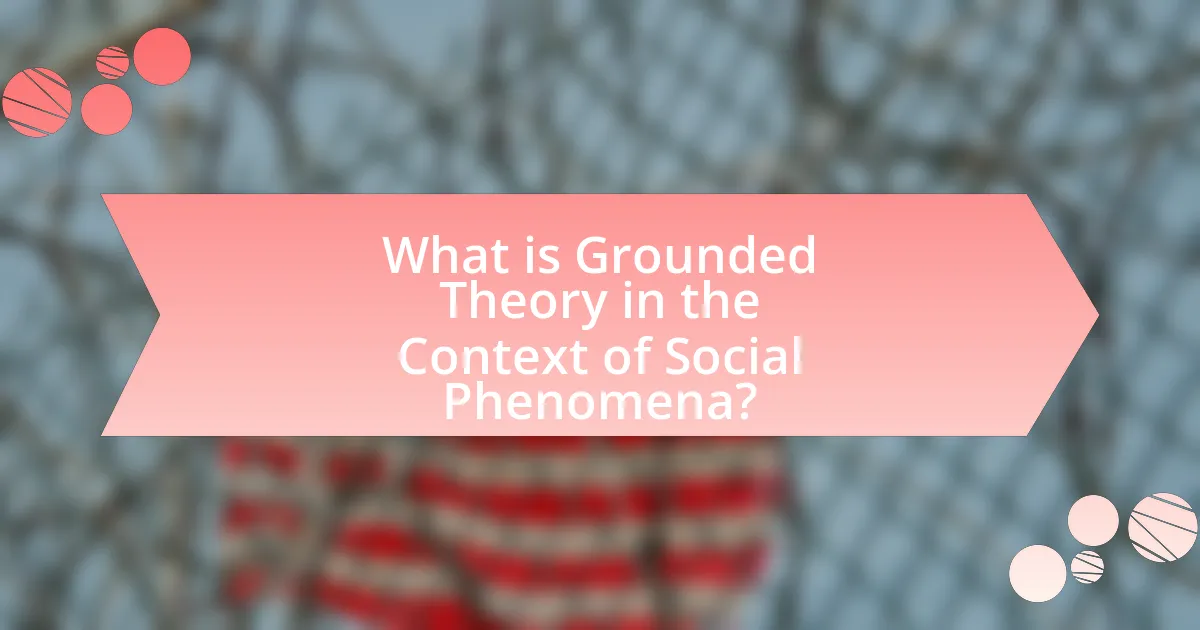Grounded Theory is a qualitative research methodology designed to generate theories based on systematically gathered data from social phenomena. This approach emphasizes the development of new theories grounded in empirical data, distinguishing it from traditional methodologies that test existing theories. Key principles of Grounded Theory include systematic data collection, the constant comparative method, and theoretical sampling, which facilitate a deeper understanding of complex social interactions and behaviors. The article explores the stages of Grounded Theory research, its application to various social phenomena, and the challenges researchers may face, while also highlighting best practices for ensuring rigor and validity in studies.

What is Grounded Theory in the Context of Social Phenomena?
Grounded Theory is a qualitative research methodology used to generate theories based on data systematically gathered from social phenomena. This approach emphasizes the importance of understanding social processes and interactions by deriving theories directly from empirical data rather than testing existing theories. Grounded Theory involves iterative data collection and analysis, allowing researchers to develop a conceptual framework that reflects the complexities of social life. The validity of Grounded Theory is supported by its widespread application in various fields, including sociology, psychology, and education, demonstrating its effectiveness in uncovering insights into human behavior and social structures.
How does Grounded Theory differ from other research methodologies?
Grounded Theory differs from other research methodologies primarily in its systematic approach to generating theory from qualitative data. Unlike traditional methodologies that may test existing theories, Grounded Theory focuses on developing new theories grounded in the data collected from participants, emphasizing the importance of the context and the participants’ perspectives. This methodology employs iterative data collection and analysis, allowing researchers to refine their theories as new data emerges, which is distinct from more linear approaches found in methodologies like experimental research or surveys. The validity of Grounded Theory’s approach is supported by its widespread application in various fields, including sociology and psychology, where it has successfully generated insights that are closely aligned with participants’ lived experiences.
What are the key principles of Grounded Theory?
The key principles of Grounded Theory include systematic data collection and analysis, the constant comparative method, theoretical sampling, and the development of theory grounded in empirical data. Systematic data collection and analysis ensure that research is closely tied to the data itself, allowing for the emergence of concepts directly from the data rather than imposing preconceived theories. The constant comparative method involves continuously comparing new data with existing data and codes to refine categories and develop a deeper understanding of the phenomenon. Theoretical sampling is a strategy used to select participants based on their relevance to the emerging theory, ensuring that the research is focused and relevant. Finally, the development of theory grounded in empirical data emphasizes that theories should emerge from the data rather than being tested against it, which is a hallmark of Grounded Theory methodology. These principles are foundational in qualitative research, as established by sociologists Barney Glaser and Anselm Strauss in their seminal work “The Discovery of Grounded Theory” published in 1967.
Why is Grounded Theory particularly suited for studying social phenomena?
Grounded Theory is particularly suited for studying social phenomena because it allows researchers to develop theories grounded in empirical data rather than preconceived notions. This methodology emphasizes the collection and analysis of qualitative data through iterative processes, enabling researchers to capture the complexities and nuances of social interactions and behaviors. For instance, in a study by Glaser and Strauss, the founders of Grounded Theory, they demonstrated how this approach can reveal patterns and insights that traditional quantitative methods might overlook, thus providing a more comprehensive understanding of social dynamics.
What are the stages involved in Grounded Theory research?
The stages involved in Grounded Theory research include data collection, open coding, axial coding, selective coding, and theory development. Initially, researchers collect qualitative data through interviews, observations, or documents. During open coding, they identify and label concepts within the data. Axial coding follows, where researchers connect categories and subcategories to understand relationships. Selective coding involves integrating and refining the theory by focusing on the core category. Finally, theory development synthesizes the findings into a coherent framework that explains the social phenomena under study. This structured approach allows for the emergence of theories grounded in empirical data, as established by Glaser and Strauss in their foundational work on Grounded Theory.
How is data collection conducted in Grounded Theory?
Data collection in Grounded Theory is conducted through systematic and iterative processes that involve gathering qualitative data from various sources, primarily through interviews, observations, and document analysis. Researchers engage in open coding, where they identify and categorize concepts from the data, allowing for the emergence of theories grounded in the collected information. This method emphasizes the importance of constant comparison, where data is continuously compared with emerging categories to refine and develop theoretical insights. The iterative nature of data collection ensures that the research evolves as new data is analyzed, leading to a deeper understanding of social phenomena.
What role does coding play in Grounded Theory analysis?
Coding is fundamental in Grounded Theory analysis as it facilitates the systematic organization and interpretation of qualitative data. Through coding, researchers identify key themes and patterns within the data, allowing for the development of theories grounded in empirical evidence. This process involves open coding, axial coding, and selective coding, which together enable a comprehensive understanding of social phenomena by linking data to theoretical concepts. The iterative nature of coding ensures that the analysis remains closely tied to the data, enhancing the validity of the emerging theory.

How can Grounded Theory be applied to understand social phenomena?
Grounded Theory can be applied to understand social phenomena by systematically collecting and analyzing qualitative data to generate theories grounded in real-world observations. This methodology allows researchers to explore complex social processes and interactions, enabling them to identify patterns and themes that emerge from the data. For instance, in a study examining community responses to a natural disaster, Grounded Theory can reveal how social networks and support systems evolve in crisis situations, providing insights into resilience and adaptation. The iterative process of data collection and analysis ensures that the resulting theories are closely aligned with participants’ experiences, enhancing the validity and relevance of the findings.
What types of social phenomena can be explored using Grounded Theory?
Grounded Theory can be used to explore various social phenomena, including social interactions, group dynamics, cultural practices, and identity formation. This qualitative research methodology allows researchers to generate theories based on data collected from participants, making it particularly effective for understanding complex social processes. For instance, studies have utilized Grounded Theory to investigate how individuals navigate social networks, the development of community identities, and the impact of cultural norms on behavior. The flexibility of Grounded Theory enables it to adapt to diverse contexts, thereby providing insights into the underlying mechanisms of social phenomena.
How does Grounded Theory facilitate the exploration of complex social issues?
Grounded Theory facilitates the exploration of complex social issues by providing a systematic methodology for generating theories grounded in empirical data. This approach allows researchers to collect and analyze qualitative data iteratively, enabling them to identify patterns and themes that emerge from participants’ experiences. For instance, in a study on healthcare access, Grounded Theory can reveal underlying social dynamics and barriers faced by different communities, leading to a deeper understanding of the issue. The iterative process of data collection and analysis ensures that the resulting theories are closely aligned with the realities of the social phenomena being studied, thus enhancing the validity and applicability of the findings.
What are some examples of social phenomena studied through Grounded Theory?
Grounded Theory has been used to study various social phenomena, including the experiences of individuals coping with chronic illness, the dynamics of group interactions in online communities, and the processes of identity formation among marginalized groups. For instance, research by Charmaz (2006) explored how individuals with chronic illness navigate their daily lives, revealing themes of identity and resilience. Additionally, studies on online communities have examined how social support is constructed and maintained, highlighting the importance of virtual interactions in shaping social bonds. Furthermore, the work of Glaser and Strauss (1967) on dying patients illustrated how individuals construct meaning in the face of mortality, providing insights into the social processes involved in end-of-life care. These examples demonstrate the versatility of Grounded Theory in uncovering complex social dynamics.
What challenges might researchers face when using Grounded Theory?
Researchers using Grounded Theory may face challenges such as difficulty in maintaining objectivity and the potential for researcher bias. The iterative nature of data collection and analysis can lead to subjective interpretations, which may skew findings. Additionally, the lack of a standardized methodology can result in inconsistencies in how Grounded Theory is applied, making it challenging to replicate studies. A study by Charmaz (2006) highlights that researchers often struggle with the balance between theoretical sensitivity and remaining grounded in the data, which can complicate the analysis process.
How can researchers overcome common obstacles in Grounded Theory research?
Researchers can overcome common obstacles in Grounded Theory research by employing systematic coding techniques and maintaining reflexivity throughout the research process. Systematic coding allows researchers to organize and analyze data effectively, ensuring that emerging themes are grounded in the data itself. For instance, using open, axial, and selective coding can help clarify relationships between concepts and facilitate deeper insights. Maintaining reflexivity involves continuously reflecting on the researcher’s biases and assumptions, which can enhance the credibility of the findings. Studies have shown that reflexivity can lead to more nuanced interpretations of data, as highlighted in the work of Charmaz (2006) in “Constructing Grounded Theory.” By integrating these strategies, researchers can navigate challenges such as data overload and subjective interpretation, ultimately leading to more robust and reliable outcomes in their Grounded Theory studies.
What ethical considerations should be taken into account?
Ethical considerations in understanding social phenomena through grounded theory include informed consent, confidentiality, and the potential impact of research findings on participants and communities. Informed consent ensures that participants are fully aware of the research purpose and their rights, which is crucial for ethical integrity. Confidentiality protects participants’ identities and personal information, fostering trust and encouraging honest participation. Additionally, researchers must consider the implications of their findings, as they can influence public perception and policy, potentially affecting the communities involved. These considerations are supported by ethical guidelines from organizations such as the American Psychological Association, which emphasize the importance of ethical research practices in social sciences.

What insights can be gained from applying Grounded Theory to social phenomena?
Applying Grounded Theory to social phenomena yields insights into the underlying processes and patterns that shape social interactions and behaviors. This qualitative research methodology allows researchers to develop theories grounded in empirical data, facilitating a deeper understanding of how individuals construct meaning within their social contexts. For instance, studies have shown that Grounded Theory can reveal the complexities of social dynamics, such as identity formation and group behavior, by systematically analyzing data collected from interviews and observations. This approach has been validated in various fields, including sociology and psychology, where it has successfully uncovered nuanced perspectives on issues like community resilience and social change.
How does Grounded Theory contribute to theoretical development in social sciences?
Grounded Theory contributes to theoretical development in social sciences by providing a systematic methodology for generating theories grounded in empirical data. This approach allows researchers to develop concepts and frameworks that are directly informed by the realities of social phenomena, rather than relying solely on pre-existing theories. For instance, in a study by Glaser and Strauss in 1967, they demonstrated how Grounded Theory could uncover patterns in social interactions, leading to the formulation of new theoretical insights about social processes. This empirical foundation enhances the relevance and applicability of theories in understanding complex social dynamics.
What are the implications of findings derived from Grounded Theory studies?
Findings derived from Grounded Theory studies have significant implications for understanding social phenomena, as they provide a systematic approach to generating theories grounded in empirical data. This methodology allows researchers to uncover patterns and relationships within social contexts, leading to insights that can inform practice, policy, and further research. For instance, a study by Charmaz (2006) emphasizes that Grounded Theory enables the development of theories that are closely aligned with participants’ experiences, enhancing the relevance and applicability of the findings. Additionally, the iterative process of data collection and analysis in Grounded Theory fosters a deeper understanding of complex social issues, as demonstrated in the work of Strauss and Corbin (1998), which illustrates how grounded insights can lead to transformative changes in social practices.
How can these insights inform policy and practice?
Insights derived from grounded theory can inform policy and practice by providing a robust framework for understanding complex social phenomena. Grounded theory emphasizes data-driven analysis, allowing policymakers to identify patterns and relationships within social behaviors and structures. For instance, research by Charmaz (2006) highlights how grounded theory can reveal underlying social processes, enabling the development of targeted interventions that address specific community needs. This approach ensures that policies are not only evidence-based but also reflective of the lived experiences of individuals, thereby increasing their effectiveness and relevance in practice.
What best practices should researchers follow when using Grounded Theory?
Researchers using Grounded Theory should engage in systematic data collection and analysis to develop theories grounded in empirical evidence. This involves iterative coding processes, where researchers continuously compare data with emerging categories to refine their understanding. Additionally, maintaining a reflexive stance is crucial; researchers must be aware of their biases and how these may influence data interpretation. Employing theoretical sampling ensures that data collection is directed by the evolving theory, allowing for deeper insights into the phenomenon under study. Finally, researchers should document their decision-making processes and methodological choices transparently to enhance the credibility and reproducibility of their findings.
How can researchers ensure rigor and validity in their Grounded Theory studies?
Researchers can ensure rigor and validity in their Grounded Theory studies by employing systematic data collection and analysis methods, such as constant comparative analysis and theoretical sampling. These methods facilitate the iterative process of data gathering and analysis, allowing researchers to refine their theories based on emerging data. Additionally, maintaining a clear audit trail of decisions made throughout the research process enhances transparency and credibility. According to Charmaz (2006), using member checking, where participants review findings for accuracy, further strengthens the validity of the study. By integrating these practices, researchers can substantiate the rigor and validity of their Grounded Theory research.
What resources are available for researchers new to Grounded Theory?
Researchers new to Grounded Theory can access a variety of resources, including foundational texts, online courses, and academic journals. Key foundational texts include “The Discovery of Grounded Theory” by Barney Glaser and Anselm Strauss, which outlines the methodology’s principles and applications. Online platforms like Coursera and edX offer courses specifically focused on Grounded Theory, providing structured learning opportunities. Additionally, journals such as “Qualitative Research” and “International Journal of Qualitative Methods” frequently publish articles and case studies that illustrate the application of Grounded Theory in various research contexts. These resources collectively support researchers in understanding and applying Grounded Theory effectively.
